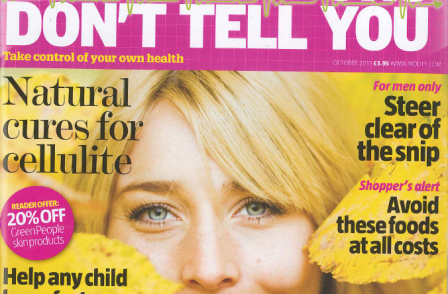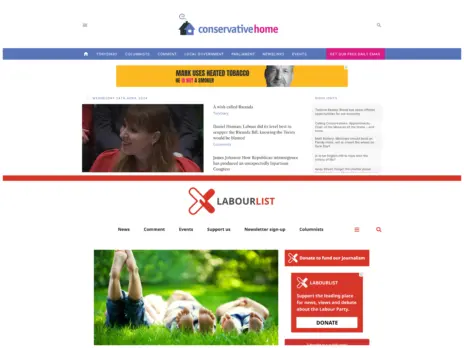
Science writer Simon Singh is known as a freedom of speech campaigner who won a high-profile libel fight against the British Chiropractic Association.
So it is perhaps surprising that he wants alternative health magazine What Doctors Don’t Tell You taken off supermarket shelves.
He is one of a number of science campaigners quoted attacking the magazine earlier this month in The Times. Others include Tracey Brown of campaign group Sense About Science, as well as number of doctors.
Brown told The Times: “If a magazine was called how to harm yourself and your friends, we wouldn’t expect to see it on supermarket shelves.”
In stark terms, campaigners against the magazine don’t just dislike it – they believe it is downright dangerous.
Some headlines from the title certainly suggest that it takes positions on medical matters which are well outside the mainstream. They include:
- Mega-cure for the incurables: Vitamin C fights it all, from measles to AIDS
- Homeopathy reverses cancer
- How multi-vaccines destroy the health of our children.
The title started life as a newsletter in 1989 and grew into a journal for alternative health practitioners. Last year it launched as a monthly on newsstands in the UK and the US.
Since then campaigners have urged distributor Comag and stockists such as Tesco to take it off the shelves claiming it carries dangerous misinformation. And they have also taken it to the Advertising Standards Agency numerous times over the health claims made by its alternative medicine advertisers, with 12 complaints upheld so far.
Editors of WDDTY Lynne MacTaggart and her husband Bryan Hubbard insist that all they are doing is reporting on research and on claims made by those involved in alternative medicine.
MacTaggart says: “By the very nature of our title we are giving people the other side of the story.”
MacTaggart contacted Press Gazette because she was unhappy at the way we had covered the Times story attacking her magazine and she talked about the possibility of legal action.
(That Press Gazette story was taken down as an interim measure and a slightly amended version is now live again – the main change is the removal of the disputed claim that WDDTY said vitamin C could cure AIDS.)
MacTaggart and Hubbard say they are still considering the possibilty of libel action against The Times, and are taking legal advice from Carter Ruck.
On the vitamin C and AIDS claim in The Times, MacTaggart says: “That assertion was emphatically inaccurate. We never claimed Vitamin C cures AIDS we simply reported on a story which stated 250 patients who tested positive for HIV were given large doses of vitamin C…we were not making any claims.”
What Doctors Don’t Tell You’s central premises seems to be skepticism over conventional medicine. The September edition quotes data from the US Department of Health that “adverse drug reactions/medical errors” are the third biggest cause of death in the US after heart disease and cancer.
MacTaggart says: “There are millions of people out there who want something beyond the drug-based mainstream for chronic illnesses.”
But what about that headline about homeopathy reversing cancer? Homeopathy is a red-rag for science campaigners who see it as simply a way of marketing sugar pills to gullible consumers. It is acknowledged that homeopathic dilutions are so extreme that the final remedies do not contain a single molecule of the substance they are based on.
Again MacTaggart says the story is reporting on research. The article in question quotes a review of work carried out by the Homeopathic Research Foundation in India which it says suggests that homeopathy cures or halts cancer in 40 per cent of cases.
And the article claiming that multi-vaccines such as MMR “destroy the health of our children”?
“That’s true”, MacTaggart says, adding: “It doesn’t mean we are saying ‘don’t do it’, we are not telling anyone to do anything.”
The report in question quoted research which WDDTY said linked childhood vaccination to ADHD, autism and asthma.
Asked whether the research they report on is credible, ie whether it conforms to standards over being double-blind and including placebos (so doctors and patients involved don’t know whether are getting real medicine or are in the ‘control’ placebo group), Hubbard questons whether such trials work and says “80 per cent of drug trials are fraudulent”.
He adds: “Medicine is not a science, it’s an art and it’s down to the skill of the practictioner. If it were a science, it wouldn’t matter who did it – the result would be the same.”
MacTaggart says that the conversation about whether drugs work or not has been held in private between doctors and says: “We are trying to make that private conversation public. I think the public have a right to know.”
WDDTY has a staff of 15 and a print-run of around 30,000 with around 250,000 website visitors per month
MacTaggart and Hubbard clearly hold beliefs that many doctors strongly disagree with – particularly when it comes to their skepticism about vaccination, their belief in homeopathy and their views about the treatment of cancer.
And a browse through the magazine shows that it makes little or no attempt at balancing its articles with more mainstream scientific opinion.
But does it have as much right to freedom of expression as those who endorse more mainstream scientific views?
Simon Singh: “They are at liberty to print what they want and Tesco are at liberty to stock what they want.
“With MMR newspapers were just reporting on research, but they were giving it undue credibility and creating enormous problems. When you report science and health issues you need to make sure that the balance of the story reflects the balance of the science.
“That’s the problem with What Doctors Don’t Tell You. They are preaching to a readership that is already suspicious of mainstream medicine and it means they will be discouraged from giving their children the MMR vaccine or getting effective cancer treatments.
“If Tesco wants to endorse that and put it on the shelves than that’s up to Tesco. I think that’s irresponsible.
“It’s not a free speech issue it’s about public health and responsibility.”
Email pged@pressgazette.co.uk to point out mistakes, provide story tips or send in a letter for publication on our "Letters Page" blog






